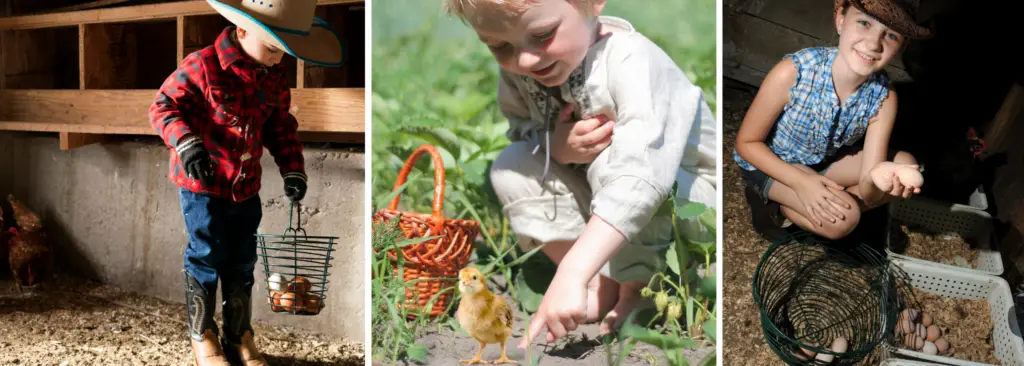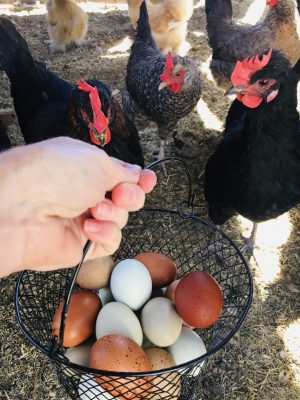
What will you do with your chickens if they die from old age, illness or predator attack?
Do you know how to dispose of a dead chicken?
Most people don’t think this far in advance when purchasing their baby chicks, but it is important to have a plan in place.
This article will help you to:
- Decide what is best for you to do with your aging chickens.
- Determine the cause of your chickens’ death.
- Know how to dispose of a dead chicken.
- Grieving after the loss of a chicken.
- Moving on after you lose one of your flock.
1. Caring for or Rehoming an Aging Chicken
Caring for an Aging Chicken
Are you strong enough to be able to handle any health issues and emotional distress that finding a chicken dead in a nesting box may bring to you?
It can be quite stressful finding a chicken that you have cared for several years deceased.
If you choose to care for an aging chicken, it is important to prepare yourself emotionally for their passing.
Know the signs of a distressed or ill chicken:
| SIGNS OF ILLNESS OR DISTRESS IN A CHICKEN |
|---|
| DISCHARGE FROM MOUTH OR NOSE |
| LETHARGY |
| ISOLATION |
| DECREASED APPETITE |
| DIARRHEA |
| PALE COMB |
| PURPLE COMB |
| PANTING |
| IMPACTED CROP |
| SEIZURES |
Rehoming Aging Chickens
Plan ahead if you want to rehome your aging chickens. There are several options to choose from. Do what works best for you.
- Sell your aging chickens online. There are several online resources for selling your chickens: Social Media, Craigslist, Next Door, Offer Up or even advertise a garage sale online.
- Give your chickens to a local farmer. If you live in a rural area, there may be several local farmers that would be willing to take in your older chickens.
- Find a chicken sanctuary or retirement farm that accepts aging chickens. You might get lucky and find one not too far from you that you can bring your aging chickens to so they can live out the rest of their life.
- Eat them. To some this may seem cruel, but it is a smart solution if you are not wanting to keep chickens when their egg production declines each year.
- Livestock Auction– Go online and search for the closest livestock auction houses. Give them a call and see if they take aging chickens and what type of crates and bedding are required to sell them there.

2. Determine the Cause of Your Chickens’ Death
Knowing what the cause of your chickens’ death is can help prevent additional deaths within your flock.
- Old Age-the average chicken lives about 8 years. In order for a chicken to live a long life, they must be provided a proper diet and living environment. If you have a chicken that passes at only 2 years of age, it is most likely not old age, but more likely disease or illness.
- Disease/Illness-Know the signs of disease or illness in chickens. If one of your chickens dies from an illness or disease, it is important to inspect the whole flock and isolate any other ill chickens. In some circumstances, such as parasites, the whole flock needs to be treated.
- Predator Attack-If you have a chicken that died due to a predator attack, it is important to know what type of predator attacked and how the predator got into your coop. Make any repairs and modifications to your chicken coop to prevent another attack.
3. How do You Dispose of a Dead Chicken?
Unfortunately, if you own chickens, you will eventually have to deal with the death of a chick or chicken. It can be very unsettling finding a chicken dead in a nesting box or decapitated by a predator.
It’s best to prepare yourself mentally ahead of time. This includes knowing how you will dispose of a dead chicken.
Some cities, towns and neighborhood associations have restrictions on how you can dispose of animals. Knowing what you will do if this happens to one of your flock ahead of time can make the process a little easier.
| HOW TO DISPOSE OF A DEAD CHICKEN |
|---|
| ASK VETERINARIAN TO DISPOSE OF YOUR DECEASED CHICKEN |
| FEED DEAD CHICKENS TO PIGS |
| CREMATION |
| BURY YOUR DEAD CHICKENS |
| ADD TO COMPOST BIN |
| *THROW IN YOUR GARBAGE |
Is it Illegal to Bury a Chicken?
Some states, cities, counties or towns may allow for you to bury your deceased chicken on your property, but the neighborhood association that you live in may not.
Check with your state, city, county, town or neighborhood association that you live in to see what the laws are for burying a small animal.
How to Bury a Chicken:
If it is legal to bury a chicken in the area that you live in, it is important to bury the carcass in a biodegradable bag at least 3 feet underground. Bury them at least 100 feet away from your chicken coop so you don’t attract predators.
To deter animals from smelling the decomposing carcass, sprinkle 1 cup of lime on top of the bag and make sure to compact the soil. Add another 1 cup of lime on top of the soil.
| STEPS | HOW TO BURY A CHICKEN |
|---|---|
| STEP 1 | PLACE CHICKEN IN A BIODEGRADABLE BAG |
| STEP 2 | CHOOSE A LOCATION AT LEAST 100′ FROM COOP |
| STEP3 | *DIG HOLE A MINIMUM OF 3 FEET DEEP |
| STEP 4 | PLACE CHICKEN AT BOTTOM OF HOLE |
| STEP 5 | SPRINKLE 1 CUP OF LIME ON TOP OF BAG |
| STEP 5 | COMPACT DIRT ON TOP OF CHICKEN |
| STEP 6 | SPRINKLE 1 CUP OF LIME ON TOP OF DIRT |
How Long Does it Take for a Buried Chicken to Decompose?
When you bury small animals such as poultry it takes a minimum of 60 days for them to decompose. The warmer the weather, younger and smaller the animal, the quicker it will decompose.
Animals that are not buried will decompose quicker because flies, larvae and other bugs help speed up the decomposition process by eating away at the body.
How Long Can You Keep A Chicken Before Burial?
Most states require that you bury a chicken within 24-48 hours of its death. Check with the area that you live in for specific laws. Many states will allow you to keep your chickens longer if you are planning on burying your chicken in a pet cemetery.
4. Grieving After a Chicken Dies
This may sound silly to some, but it isn’t uncommon for people that lose a chicken to actually go through a grieving process and may have a difficult time moving on. This is completely normal and healthy.
It isn’t uncommon to grieve for several months after the loss of a pet, including a chicken. Especially if they were a big part of your daily routine. Maybe they always followed you around in the garden and they are no longer there to do this.
It isn’t easy losing a pet that you have raised. Losing a chicken can be sad not only for children, but for adults as well! Special bonds are frequently formed between a chicken and their care takers.
If you have children, it is important to be open and upfront with them about the loss of their pet. If you are sad, let them know that you feel the same sadness that they are feeling. This can make them feel better to know that they are not alone.
Talking to each other about the good memories that you have had with your pet chicken can often help you to get through the grieving process.
5. Moving On After You Lose a Chicken
“Moving On” does not mean forgetting the loss of your pet chicken. It just means that you are able to feel happy and continue to live your life while still missing and keeping your lost pet in your memory.
“Moving On” also doesn’t mean that you will no longer grieve or miss your lost pet, just that you are ready to embrace life again.
It is important not to hide your sadness. Talk about your feelings to other family members and friends. Share memories that you have had of your pet chicken that passed.
Have a burial or a memorial service for your lost pet and if you have children, make sure to get them involved.
Get a notebook and write down your feelings. Sometimes this can help to be able to move on.
If you are really having trouble getting through the loss of your chicken, you can contact ASPCA Pet Loss Hotline, 1-877-474-3310
What Precautions Should be Taken When Disposing of Dead Animals?
- Wear gloves.
- Place chicken in a durable, biodegradable bag.
- Double bag if your chicken died of a suspected illness or disease.
- Take precautions not to come into contact with any parasites that may be on the chicken.
- Refrigerate as soon as possible, until you are able to dispose of (must be within 24-48 hours in most states).
Conclusion: What to do When Your Chicken Dies
Losing a pet chicken can be just as difficult to deal with as losing a family dog or cat. They become a part of your daily routine. By having a plan in place of what to do when your chicken dies, it can make the process go a lot smoother.
- Decide if you will care for or rehome your aging chicken.
- Determine what caused your chicken to die and make appropriate changes.
- Have a plan in place for the burial, cremation or disposal of your chicken.
- It’s ok and healthy to grieve after the loss of your pet chicken.
- If you are having difficulty moving on, don’t hesitate to reach out for help. Many others are out there going through similar situations that can help you to move on.
- Remember that “Moving On” does not mean that you will forget your lost pet or that you will no longer grieve and feel sad. It just means that you are ready to feel happiness and embrace the good things that you have in your life again at the same time.







